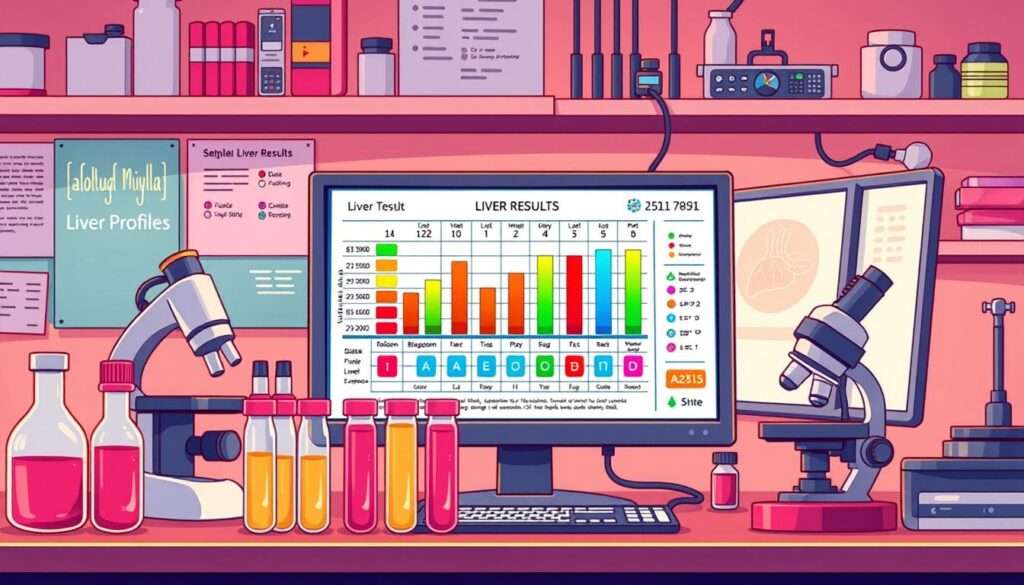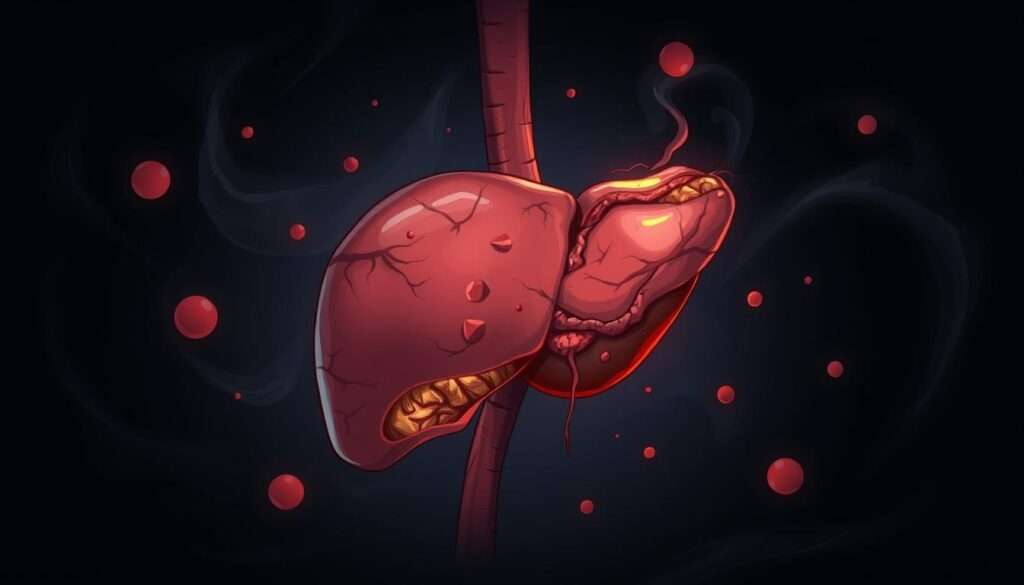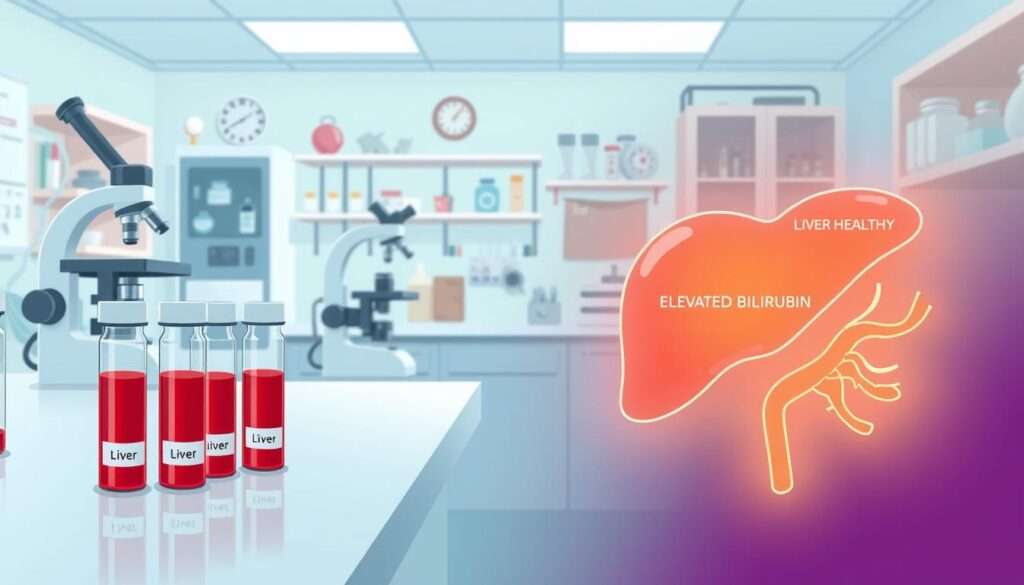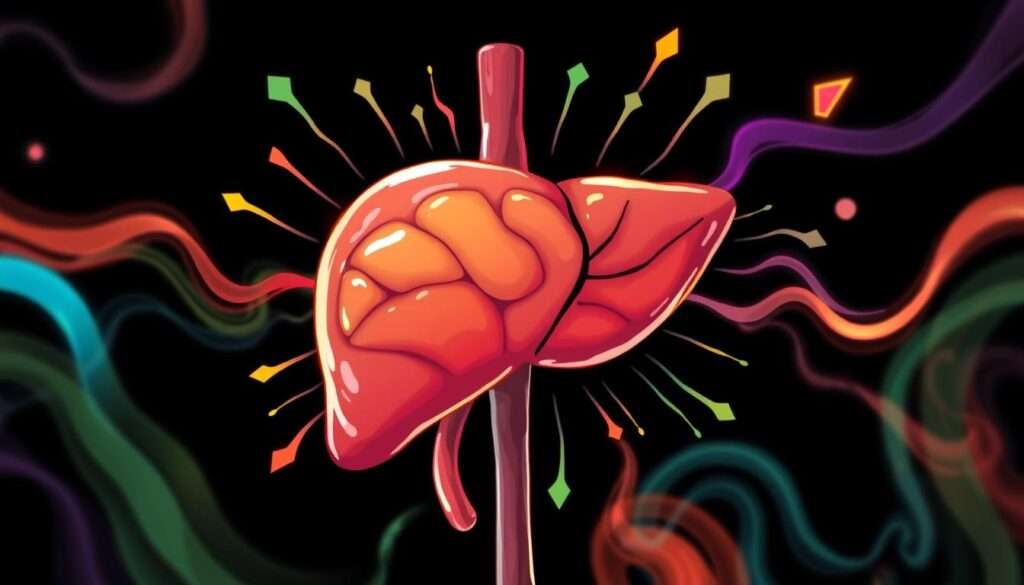Keeping your liver healthy is key to your overall well-being. A liver profile test gives important insights into your liver’s condition. It checks the levels of enzymes, proteins, and other substances in your blood.
Table of Contents
ToggleThis test shows how well your liver is working. Knowing your liver test results is very important. It helps you and your doctor find any liver problems early.
By understanding these results, you can take steps to keep your liver healthy.
Bilirubin levels show how well your liver is working. High bilirubin can mean different things, like liver disease or Gilbert’s syndrome. It can also be caused by biliary obstruction, hepatitis, gallstones, or some medicines.
Knowing the causes of high bilirubin helps you and your doctor find the problem. Then, you can work together to make your liver healthy again.
Introduction to Liver Profile Tests
Your liver is key to your health, doing over 500 important jobs. It’s vital to check your liver health with liver function tests often. These blood tests look at substances made by your liver, showing how it’s doing.
What are Liver Profile Tests?
Liver profile tests, or liver panel, check your liver’s health. They look at liver enzymes and liver proteins to find liver damage or disease.
Importance of Understanding Liver Health
Keeping your liver healthy is crucial for your body. It handles metabolism, digestion, and removing toxins. Regular liver health checks help spot problems early and keep your liver working well.
Understanding your liver function tests helps you make better health choices. It supports your liver’s important role in your body.
Components of a Liver Profile Test
When you get a liver profile test, your doctor checks several important parts. They look at liver enzymes, proteins, and bilirubin levels. These help understand your liver’s health.
Enzymes Measured
The test checks liver enzymes like ALT, AST, ALP, and GGT. These enzymes show if your liver is damaged or not working right. High levels can mean liver problems.
Proteins Evaluated
The test also looks at liver proteins like albumin and total protein. These proteins help the liver do its job. If their levels are off, it could mean liver disease.
Bilirubin Levels
Bilirubin comes from broken-down red blood cells. The liver removes it from the body. High bilirubin levels can mean liver disease or other liver issues.
These parts of a liver profile test give a full view of your liver’s health. They help doctors find any liver problems or concerns.
Liver Profile Test
The liver profile test checks how well your liver works. It looks at how your liver filters toxins, breaks down nutrients, and helps with blood clotting.
Purpose of the Liver Profile Test
Doctors use this test for many reasons. It helps find liver damage or problems, track liver conditions, check if medicines are safe, and find the cause of symptoms like fatigue or jaundice.
When is it Recommended?
This test is often suggested during routine check-ups. It’s especially important if you’ve had liver issues before or are taking medicines that might harm your liver. It’s also good if you’re feeling tired, nauseous, or have yellow skin.
Getting this test regularly can spot liver problems early. This lets doctors treat you sooner. Knowing your liver health helps you stay healthy.
Interpreting Liver Profile Test Results
It’s important to understand your liver test results. Each part of the test has a normal range. This range helps doctors see if your liver is healthy.
Normal Range Values
The normal ranges for liver tests can differ slightly. But, they usually fall within these ranges:
- Total protein: 5.5 to 9.0 g/100 mL (55-90 g/L)
- Bilirubin (total): 0.1 to 1.2 mg/dL (1.7-20.5 µmol/L)
- Bilirubin (direct): Less than 0.3 mg/dL (5.1 µmol/L)
- Alanine aminotransferase (ALT): 19-33 units/L for females, 29-33 units/L for males
- Aspartate aminotransferase (AST): 8-48 units/L
- Alkaline phosphatase (ALP): 44-147 units/L
Patterns of Abnormal Results
If your test results are not in the normal range, it might mean you have a liver problem. Looking at the patterns of abnormal results can help find the cause:
- High liver enzymes (ALT, AST, ALP) can mean liver damage or inflammation. This could be from hepatitis, fatty liver, or liver injury.
- Changes in protein levels, like low albumin or high globulin, suggest liver issues or chronic disease.
- High bilirubin, especially the direct form, points to bile duct problems. This could be from gallstones or other biliary issues.
Knowing the normal ranges and understanding abnormal results helps you and your doctor find and fix liver problems.

Liver Diseases and Conditions
Your liver is very important for your health. It can get sick with diseases like hepatitis, cirrhosis, fatty liver disease, and liver cancer. These can make it hard for your liver to work right.
Hepatitis is when your liver gets inflamed, usually from viruses. There are many types, like hepatitis A, B, C, D, and E. Getting the right treatment is key to stop more damage.
Cirrhosis makes your liver scarred and less able to work. It often happens from drinking too much alcohol or other liver problems. If not treated, it can cause serious issues like fluid buildup and bleeding.
Fatty liver disease happens when too much fat builds up in your liver. It can come from being overweight, diabetes, or other metabolic issues. It might not show symptoms at first, but ignoring it can lead to bigger problems.
Liver cancer starts in the liver. There are different kinds, each needing its own treatment. Finding it early and treating it right is important to stop it from spreading.
Knowing about these liver diseases helps you and your doctor understand your liver test results. It’s important to keep your liver healthy.
Causes of High Bilirubin
High bilirubin levels, known as hyperbilirubinemia, can have various underlying causes. Excessive alcohol consumption is a common culprit. Drinking too much can damage the liver, leading to a buildup of bilirubin in the blood. Medications can also contribute to high bilirubin, especially certain antibiotics, cholesterol-lowering drugs, painkillers, and even some herbal supplements. These can potentially impair liver function and cause an increase in bilirubin.
Alcohol Consumption
When you consume alcohol, your liver works hard to break it down. However, excessive alcohol intake can overwhelm the liver and cause damage to liver cells. This can lead to a rise in bilirubin levels, potentially causing jaundice, a yellowish discoloration of the skin and eyes.
Medications and Liver Damage
Certain medications, including antibiotics, cholesterol-lowering drugs, and over-the-counter pain relievers, can also contribute to elevated bilirubin levels. These drugs can sometimes cause liver damage, impairing the liver’s ability to effectively process and eliminate bilirubin from the body.

If you’re taking any medications, it’s important to discuss your liver profile test results with your healthcare provider. They can help determine if the medications you’re taking may be the cause of your high bilirubin levels and explore alternative treatment options if necessary.
Preparing for a Liver Profile Test
Getting a liver profile test is key to checking your liver health. To get accurate results, you must prepare well. Here are some tips to remember:
Fasting Requirements
You need to fast for 10-12 hours before the test. This means no food, drinks (except water), or some medicines. Fasting gives a clear view of your liver’s work without outside influences.
Medication and Supplement Disclosure
Tell your doctor about all medicines, supplements, or herbs you take. Some can change your liver test results. Your doctor needs to know about them .
Avoiding Alcohol
Don’t drink alcohol for days before the test. Alcohol can raise liver enzyme levels, affecting test results. You should not drink alcohol for at least 72 hours before.
By following these steps, your liver test will give a true picture of your liver health. Always talk to your doctor about any worries or questions. This makes the testing process smooth and helpful.
Follow-up Testing and Monitoring
If your liver profile test shows something abnormal, your doctor might suggest more tests. These tests help understand your liver better. They are key to spotting any issues early.
Additional Diagnostic Tests
Your doctor may order tests to check your liver:
- Imaging studies, like ultrasound, CT scan, or MRI, to see your liver’s structure and condition.
- A liver biopsy, where a small liver sample is taken for analysis.
- More blood tests to measure liver enzymes or proteins for detailed liver health info.
These tests help find the cause of liver problems. They guide your doctor in creating a treatment plan. It’s vital to keep checking your liver health, especially if you have a liver condition or are at risk.

Understanding the need for follow-up tests and monitoring is important. It lets you take charge of your liver health. By working with your healthcare provider, you can keep your liver in top shape.
Lifestyle Changes for Liver Health
Keeping your liver healthy is key for your overall well-being. You can support your liver with simple steps. Making a few lifestyle changes can help your liver function well.
First, cut down on alcohol. Too much alcohol can harm your liver. If you drink, limit it to one drink a day for women and two for men.
Your diet also matters for liver health. Eat foods rich in fruits, veggies, whole grains, lean proteins, and healthy fats. These foods help your liver. Stay away from high-fat, high-sugar, and processed foods.
Exercise is good for your liver too. Walking, swimming, or strength training helps. It keeps you healthy and supports your liver. Try to exercise for 30 minutes most days.
- Limit alcohol consumption to no more than one drink per day for women and two for men
- Eat a balanced diet rich in fruits, vegetables, whole grains, lean proteins, and healthy fats
- Engage in regular exercise, such as walking, swimming, or strength training, for at least 30 minutes most days of the week
By changing your lifestyle, you can help your liver. A healthy liver is vital for your well-being. So, focus on these habits for a better life.
Risk Factors and Causes of Elevated Liver Enzymes
If your liver profile test shows high liver enzymes, it’s important to know why. Many things can cause this, like:
- Alcohol consumption: Drinking too much alcohol is a big reason for high liver enzymes. It can cause serious liver problems like alcoholic hepatitis and cirrhosis.
- Certain medications: Some drugs, like antibiotics and pain relievers, can also raise liver enzyme levels.
Other things that might cause high liver enzymes include:
- Nonalcoholic fatty liver disease, a condition linked to obesity and metabolic syndrome
- Viral hepatitis (types A, B, C, D, and E)
- Autoimmune disorders like autoimmune hepatitis
- Certain infections, such as cytomegalovirus (CMV) and Epstein-Barr virus
- Liver cancer or other liver diseases
- Heart failure or other cardiovascular conditions
If you have high liver enzymes, it’s key to work with your doctor. They will help find the cause and plan the best treatment. This might include more tests, changes in your lifestyle, or adjusting your medications to keep your liver healthy.

Conclusion
Keeping your liver health in top shape is key for your overall well-being. Regular liver tests give you insights into this vital organ’s function. This lets you and Dr. Nivedita Pandey spot issues early and act fast.
Understanding a liver profile test helps you make lifestyle changes. These changes support your liver’s health. Remember, normal bilirubin levels are under 1 milligram per deciliter (mg/dL). Jaundice usually shows up when levels are over 3 mg/dL.
It’s important to work closely with your healthcare provider. This ensures your liver stays healthy. Together, you can create a plan to tackle any liver disease. You’ll also find effective treatment strategies to keep your liver working well.
FAQ
What are liver profile tests?
Liver profile tests check your liver’s health. They measure enzymes, proteins, and other substances made by the liver. This is done through blood tests.
Why are liver profile tests important?
These tests show if your liver is working right. They can spot liver damage or disease early. This lets you and your doctor take steps to keep your liver healthy.
What does a liver profile test measure?
It looks at liver enzymes like ALT, AST, ALP, and GGT. It also checks liver proteins and bilirubin levels. These can show liver or red blood cell problems.
When is a liver profile test recommended?
Doctors might suggest these tests during check-ups. They’re also used if you have liver symptoms or take liver-affecting meds. Or if you have a known liver condition.
How do I interpret my liver profile test results?
Your results are compared to normal ranges. If they’re not normal, it might mean a liver issue or another health problem. Your doctor can explain what your results mean.
What are some common liver diseases and conditions?
Common issues include hepatitis, cirrhosis, fatty liver disease, and liver cancer. Knowing about these can help you and your doctor understand your test results and plan treatment.
What can cause high liver enzymes?
Drinking too much alcohol, certain meds, and some health conditions can raise liver enzymes. Talk to your doctor about any possible causes.
How do I prepare for a liver profile test?
To get accurate results, fast for 10-12 hours before the test. Avoid alcohol for 72 hours. Also, tell your doctor about any meds or supplements that might affect the test.
What happens if my liver profile test is abnormal?
If your results are off, your doctor might do more tests. This could include imaging studies or a liver biopsy. Regular check-ups are also key.
How can I keep my liver healthy?
A healthy lifestyle helps a lot. Limit alcohol, eat well, and exercise. These habits keep your liver in good shape.
Source Links


